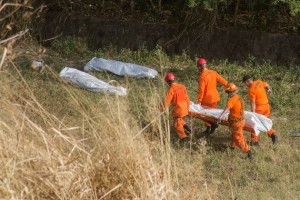El Salvador Deemed Too Dangerous For Peace Corps, But Not For Deportees
Thanks to a “heads up” from Tom Hebert (Nigeria 1962-64) this story from The Huffington Post
El Salvador Deemed Too Dangerous For Peace Corps, But Not For Deportees
The Central American country is on track to become the homicide capital of the world.
Elise Foley
Immigration & Politics Reporter
The Huffington Post

Emergency workers gather bodies after at least five people were killed, allegedly by gang members, in Ciudad Delgado on the outskirts of San Salvador, El Salvador.
Emergency workers gather bodies after at least five people were killed, allegedly by gang members, in Ciudad Delgado on the outskirts of San Salvador, El Salvador.
The Obama administration considers El Salvador too dangerous for Peace Corps volunteers, but will continue to send mothers and children with orders for deportation to the country.
The Peace Corps announced Monday that it is temporarily suspending its El Salvador program “due to the ongoing security environment.”
“Volunteers’ health, safety and security are the Peace Corps’ top priorities,” the agency said in a statement. “More than 2,300 Peace Corps volunteers have worked on community and youth development projects in communities throughout El Salvador since the program was established in 1962.”
The news comes as the White House faces increasing pressure to halt deportations of mothers and children to El Salvador, Honduras and Guatemala. The Department of Homeland Security began to conduct raids this month on families with deportation orders who were apprehended after May 1, 2014, and so far has picked up at least 121 individuals.
It’s not just the Peace Corps that considers El Salvador to be dangerous. The State Department reissued a warning in June for Americans considering traveling there, citing the rate of violent crimes in the country. According to the State Department, 34 Americans have been murdered in the country since January 2010, including a 9-year-old, and only six of their cases resulted in convictions. Although “there is no information to suggest that U.S. citizens are specifically targeted by criminals,” the department warns, “crime and violence are serious problems throughout the country.”
El Salvadorans are in the greatest danger, which many experts say is the primary reason people, especially mothers and children, are fleeing for other countries. Since October, border agents have apprehended more than 5,000 El Salvadoran children traveling without their parents and more than 7,200 El Salvadoran families.
“Americans in the country, whether they’re Peace Corps or they’re visitors or they’re just traveling — they’re affected by the violence, but they’re much more able to deal with it,” said Mike Allison, a professor who studies the region and who last traveled to El Salvador in July.
“Taking private cars and taxis, tour buses, going to safer areas of the country, frequenting areas of the country that have better security — it doesn’t mean that they can avoid violence in its entirety, but they’re in a much safer position than Salvadorans who have to live through this violence on a day to day basis,” he added.
El Salvador’s murder rate spiked last year to roughly 104 per 100,000 residents following the collapse of a truce among the country’s gangs. That homicide rate outpaced the rate of killings during the country’s brutal civil war that lasted from 1980 to 1992 and put El Salvador on track to become the most violent country in the world, overtaking Honduras.
The Peace Corps suspended its Honduras program in 2012 for safety reasons. Violence there has dropped sharply over the last two years, but the country’s homicide rate of 61 per 100,000, according to preliminary figures reported last month in the local press, still makes it one of the world’s most violent. The State Department issued a travel warning for Honduras, similar to the one issued for El Salvador, in October.
To help improve the conditions that drive emigration, President Barack Obamarequested $1 billion last year in aid for Central America, and Congress allocated $750 million.
The administration allows people from El Salvador to apply for temporary protected status, but only if they have been in the U.S. since at least March 2001. Many House Democrats and activists are calling on the administration to extend this status to Central Americans who entered the country more recently. Hondurans can apply for temporary protected status if they have been in the U.S. since January 1999.
White House Press Secretary Josh Earnest said Monday that the administration would continue its enforcement actions, along with efforts to improve conditions in Central America. But he said there were no current plans to extend temporary protected status.
“At this point our policy will remain the same,” he told reporters at a briefing.
I think back to El Salvador in 1994
We had the honor of placing volunteers there once again after the civil war.
Our volunteers went to the former rebel held territory and sat in the plaza pointing out where the nuns had been murdered.
It was a time of hope because the Peace Cofps was back.
Patti is correct, and if and when conditions improve Peace Corps will go back. I took 30 years, but Peace Corps Returned to Colombia, but only the northern coast.
There have been a couple of countries where Peace Volunteers were ordered to leave by Washington, and guess what? They refused. Okay, El Salvador volunteers, did in your heels until the forced return of Salvadorans is stopped.
Anyone want to help me organize a protest in Washington? With as many former El Salvador volunteers as possible?